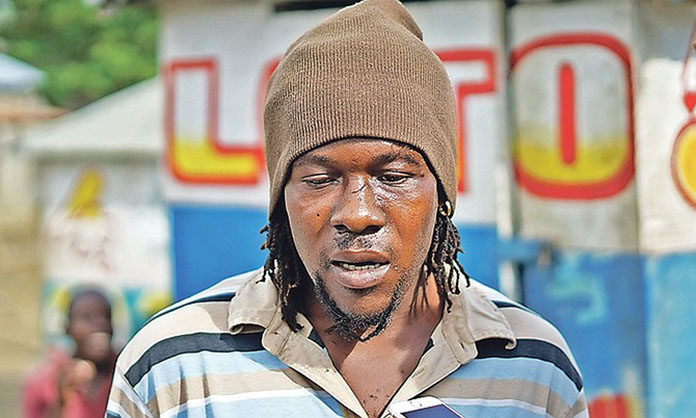Appellate Judge Questions Jean Rony Decision

By NICO SCAVELLA
Tribune Staff Reporter
nscavella@tribunemedia.net
AN appellate judge has questioned whether a Supreme Court judge had the power to compel the government to cause Bahamas-born Jean Rony Jean-Charles to be returned to the Bahamas despite him having no right to remain in the country.
Acting appellate judge Sir Michael Barnett said on Friday that he was “struggling” over whether Justice Gregory Hilton could have ordered the state to see to Mr Jean-Charles’ return from Haiti, given his assertions that the man is not a citizen of this country, but conversely, based on the evidence, a Haitian national. In response, lead defence attorney Fred Smith, QC, submitted that the issue surrounding Mr Jean Charles’ status was irrelevant, he could not accept that his client is a non-citizen, mainly because he was born here.
In fielding Sir Michael’s assertions that one is either a citizen or a non-citizen, Mr Smith said there exists a third category of persons in the country in similar positions as Mr Jean-Charles who do not fall under certain categories under the Immigration Act that would compel the state to remove them.
Further, Mr Smith said while the assertion is Mr Jean-Charles is not a citizen and thus does not have an automatic right to remain in the Bahamas, he was, due to him being born here, entitled not to be expelled from the country as he was on November 24.
Mr Smith further submitted that under article 25 of the Constitution, Mr Jean-Charles enjoyed a right to move freely about the Bahamas and, coupled with there being no law requiring proof of status to remain in the country, was entitled not to be expelled from the Bahamas.
Thus, Mr Smith said when Justice Hilton made his order in January for the government to issue a travel document to Mr Jean-Charles to “allow and permit” him to travel from Haiti to the Bahamas, the judge was merely reversing the “abuse” Mr Jean-Charles endured by putting him in the same position he was in prior to his repatriation.
And where Justice Hilton ordered the minister and director of immigration to issue “such status” that would “permit him to remain in the Bahamas and to legally seek gainful employment”, Mr Smith submitted that was to further protect Mr Jean-Charles from being subjected from the same abuse he would have experienced.
As in the initial hearing in May, there was much debate over the discrepancy surrounding whether the individual immigration authorities said they deported — Jean Charles, and Mr Jean-Charles – are one and the same.
According to a Return to Mr Smith’s writ of habeas corpus to have the government produce Mr Jean-Charles’ body, on September 18, 2017 an adult Haitian national who gave his name as “Jean Charles” and stated his date of birth as December 1, 1985, was arrested and detained by immigration officers during a routine status check on Fire Trail Road.
Due to “Jean Charles” being unable to provide officials with any documents or proof concerning his lawful presence in the Bahamas, he was taken to the detention centre for further processing relative to suspected contravention of the Immigration Act.
After an unsuccessful check at the Birth Registry for the name “Jean Charles” and the associated date of birth, that individual was returned to Haiti on a Bahamasair charter flight on November 24, 2017. He later confirmed his identity as “Jean Charles,” date of birth December 1, 1985 during a roll call of passengers prior to boarding.
Once the flight landed in Haiti, the man was handed over to Haitian authorities, and thus any custody or control of “Jean Charles” by the Bahamas government came to an end on November 24, 2017, the Crown maintained.
Sir Michael, during the initial hearing, noted that the issue was apparently unsolved by Justice Hilton as evidenced in his ruling when he said he was concerned” about the “uncertainty” surrounding the issue, and that there can be “no conclusive answer or determination on the question”.
Justice Hilton ultimately said he would refer to the individual in question as “Jean-Rony Jean Charles AKA Jean Charles”, however, the appellate judges, Sir Michael in particular, noted that the confusion over the issue is still a “live” one that has not been resolved to date.
Sir Michael thus questioned how Justice Hilton could have come to a conclusion on the constitutional motion if he had no conclusive answer as to who Mr Jean-Charles was/is, adding that the answer to that question was “fundamental” to the resolution of the constitutional motion.
During Friday’s hearing, Mr Smith suggested that the confusion over whether Mr Jean-Charles and the individual referred to as “Jean Charles” are one and the same was a non-issue, as Justice Hilton did not concern himself with the accuracy or identity of the individual, but rather the “body by whatsoever name he may be called”.
Additionally, Mr Smith charged that at the last hearing, the Crown conceded that the person who was deported from the Bahamas on November 24 is the person that was returned subsequent to the court order. He further stressed that it was the Crown’s case in the court below that Mr Jean-Charles and the “Jean Charles” they removed from the Bahamas was “one and the same person”.
Mr Smith also asserted that the Crown has not raised the issue surrounding the identity of the person in question in any of its grounds of appeal.
Mr Smith further submitted that the Crown must have known who Mr Jean-Charles was because they placed a picture on the travel document, thus suggesting that they knew to whom to give the travel document.
The case continues.
Mr Smith’s submissions came during the second hearing over the Crown’s appeal of Justice Hilton’s landmark decision concerning Mr Jean-Charles’ controversial deportation from the Bahamas to Haiti.
At the time, Justice Hilton found that Mr Jean-Charles was “unlawfully expelled” from the Bahamas after having been unlawfully detained from September 17, 2017 to November 24, 2017, in breach of his right guaranteed under Article 25 (1) of the Constitution.
Justice Hilton further found Mr Jean-Charles has been deprived of his personal liberty, unlawfully arrested and detained/falsely imprisoned in breach of his rights guaranteed him under the Constitution.
He ordered the government to issue a travel document to Mr Jean-Charles to “allow and permit” him to travel from Haiti into the Bahamas, and that it pay the “reasonable cost” of Mr Jean-Charles’ journey “forthwith upon his return”.
Justice Hilton further ordered the minister and director of immigration should, no later than 60 days after Mr Jean-Charles’ return and upon his application, issue “such status” that would “permit him to remain in the Bahamas and to legally seek gainful employment.”
However, Justice Hilton dismissed the writ of habeas corpus Mr Smith had filed on November 29 for the government to produce Mr Jean-Charles, finding as Mr Jean-Charles was not in the custody of the state at the time the application for the writ was made, the order for the writ should not have been issued.
The Crown is contending that Justice Hilton’s ruling was ultimately based on “flimsy” and “very dubious” evidence, and that such evidence warranted the ruling being set aside or alternatively reheard with “proper submissions and evidence”.
The Crown, led by attorney Loren Klein, has also submitted that the evidence in support of Mr Jean-Charles’ constitutional motion was “third-party” evidence and not entirely reliable, as he questioned the veracity of a lot of the claims contained therein.
Mr Klein has also asserted that Justice Hilton placed “a lot of stock” in Ms Jean-Charles’ claim that her brother never left the Bahamas, despite admissions by Mr Jean-Charles’ legal team that he was the beneficiary of several travel documents, with the reasonable inference being that he used those to travel.
Mr Klein has also submitted that Justice Hilton accepted “carte blanche” that Mr Jean-Charles never left the Bahamas, and said conversely, those claims and the claims made by his counsel should have been investigated.
However, the Crown has not contested Justice Hilton’s dismissal of the writ of habeas corpus, but has instead called for the appellate court to affirm Justice Hilton’s decision to dismiss that application.
The rationale for doing so, Mr Klein has maintained, is that while Mr Jean-Charles’ constitutional motion was mainly supported by the contents of a sworn affidavit by his sister Clotilde Jean-Charles, her affidavit was solely in support of the habeas corpus application.
However, Mr Klein submitted Justice Hilton accepted Ms Jean-Charles’ affidavit for the purposes of the constitutional motion.
Nonetheless, Mr Klein contended that once the habeas corpus application fell away consequent to Justice Hilton dismissing it, any evidence it relied on should have fallen away as well, thus meaning the constitutional motion should likewise be dismissed.
According to Justice Hilton’s ruling, which referred to an affidavit sworn by Ms Jean Charles, Mr Jean-Charles was born at the Princess Margaret Hospital in New Providence on December 5, 1982.
He was arrested by immigration officers last September and detained at the Carmichael Road Detention Centre from that date up to the swearing of Ms Jean Charles’ affidavit.
Mr Jean-Charles was never charged with any offence under the Immigration Act or any other law, according to the ruling, and neither was he ever taken before any court. He was never served with a deportation or a detention order, and had never been outside of the Bahamas.







